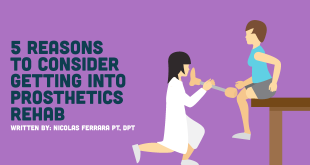Those Numbers are People Too: An Important Lesson in Outpatient Orthopedics
When I graduated physical therapy school 6 months ago, I felt an immediate sense of relief. Grad school felt like a world of numbers. Success was often measured according to test grades, practical scores, cumulative GPA and ultimately the boards.
I was so glad to leave these benchmark numbers behind and focus on patient care. What I did not realize is that I would once again be faced with numbers pressure as I entered the real world as a physical therapist in an outpatient orthopedic setting.
The emphasis on grades was quickly replaced with an emphasis on productivity and I was stressed – more stressed than I had been in school. This was a challenge that I was not initially prepared to navigate. It wasn’t until I made a conscious effort to shift my focus that I was able to offset the stress that accompanied the pressure to hit productivity goals. I was happier, calmer, AND my numbers looked good.
So what did I do?
Work for the patients, not the numbers
On the whole, physical therapists enter this profession because we want to help others. We don’t work in finance where numbers are the obvious focus and as new grads, we are typically not business owners who dedicate much of their time to monitoring revenue and profit. Thus, the productivity pressure in the PT workplace can come as a shock to a new physical therapist. It is too easy to get wrapped up in the numbers, especially if that is the culture of the clinic where you work. However, one of the most important lessons I have learned over the past 6 months is that this is a surefire way to burn out.
I have a type-A personality and I am eager to please. These qualities often work in my favor, but they initially hurt me when I entered the physical therapy workforce. I became so worried about seeing a certain amount of patients per week that I was often exhausted and frustrated by my performance. However, this was because my priorities were off. Amidst this frustration, I took the time to reflect on my clinical performance as a new physical therapist.
I realized that many of my patients were satisfied with their progress, they seemed to enjoy coming to physical therapy, and they entrusted me with their care. It was then that I decided I would stop worrying about trying to see a certain number of patients each week and instead focus on making sure all of my patients were scheduled because they needed my help.
If I came in early to see patients it was because it was a busy time of year and some of my patients were having trouble getting in, NOT because I was trying to hit some magic number for the day. I didn’t skip a break to hit a quota; I did it because a patient of mine could only leave work at that time.
Patients come first
Any practice owner will tell you that the focus on numbers is a necessary evil in an outpatient orthopedic setting. I do not disagree with this sentiment. I fully understand the importance of monitoring productivity. We do, after all, need to make money. However, as a new physical therapist I have different responsibilities than a practice owner. I do not have to calculate expenses and revenue or worry about the general productivity of the practice. As a new physical therapist my primary responsibilities are my patients and my clinical development. Yes, one day numbers may be a focus should I decide to open my own practice, but that is not the case right now.
I strongly caution new grads against falling victim to the tunnel vision approach to productivity. It is a given that your clinic will set a standard for your productivity. Understand what is expected of you, but never forget that your responsibility is your patients. Try not to get stuck on that number next to your name each week, month or quarter. Every time your numbers are set out in front of you, recognize that it reflects the patients you have helped and gotten to know. Your numbers are a consequence of your care.
Keep learning to provide good care
While our productivity is a necessary consideration in our progress as physical therapists, it is not automatically correlated with the level of care. Exceeding productivity expectations one month is not a direct measure of clinical success. When I am congratulated for seeing a lot of patients, I take the accolades with a grain of salt. While it is great that I have met expectations with regards to my numbers, I must continue to expand my knowledge and skills in order to truly succeed as a physical therapist.
As a novice physical therapist, I understand that I have a lot to learn. Whether it involves signing up for continuing education, reading journal articles or meeting with fellow physical therapists to practice treatment techniques, I must dedicate time to my improvement as a clinician. This is what my patients expect and need from me. I only feel proud of my high numbers when I know they were accompanied by good care. In isolation, those numbers mean very little.
Let’s shift the focus
I challenge every new grad physical therapist to pause and reflect on the amount of time they spend thinking or speaking about their numbers versus the amount of time they spend thinking or speaking about patient progress and quality of care.
Unless we keep ourselves in check, this ratio can become unbalanced. The numbers take over and we lose sight of our true mission as physical therapists.
Your patients are there because they need you. Only sacrifice personal time and breaks when you feel that it will benefit the patient, not because you want a number boost. When you start practicing to help your patients instead of to help your numbers, you will feel more fulfilled and your productivity will naturally even out.
Most importantly, remember that those numbers are people. The human connection in physical therapy is one of the greatest and most important aspects of our profession. Do not allow it to be replaced by a number.
So next time you find yourself stressed about your productivity, take a step back and remember why you decided to become a physical therapist. Recognize that you are there to improve your patients’ well being, provide the best care you can and keep learning. The numbers will take care of themselves.
Browse outpatient orthopedic jobs
 NewGradPhysicalTherapy.com The Largest Online Resource For New Grad Physical Therapists
NewGradPhysicalTherapy.com The Largest Online Resource For New Grad Physical Therapists




